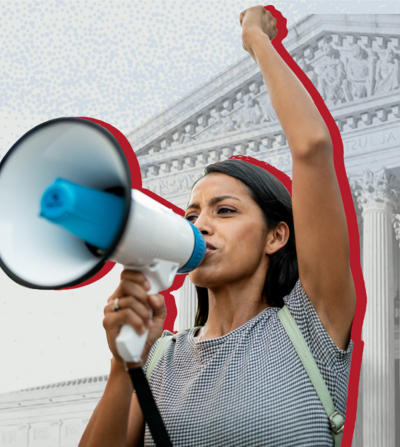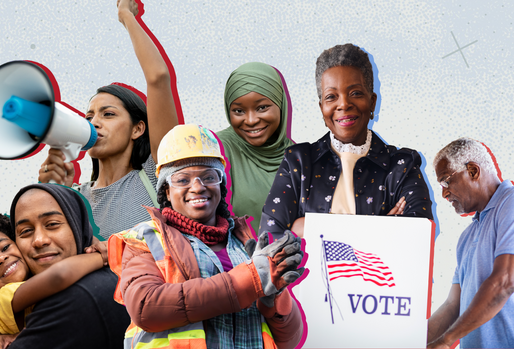

A Representative and Accountable Government
The Dēmos Power Agenda: A Framework for Building People Power offers a roadmap for our shared future. A Representative and Accountable Government is the final pillar of the Power Agenda, reflecting our vision for ensuring that our government is representative and accountable to its people.
Dēmos envisions a government that embeds public participation in its decision-making and centers the will and well-being of the people.
Corporate and wealthy elites have a stronghold on government levers, creating policies that benefit only the few, often at the expense of the public.
To ensure that our government is representative and accountable to its people, Dēmos is focused on:
- Investing in public campaign financing programs that enable more Black and brown candidates to run for office and foster deeper partnerships between elected leaders and their communities.
- Advancing Supreme Court expansion and other necessary reforms to stop the far-right corporate takeover of the federal judiciary.
- Ensuring the public, especially Black and brown communities, are at the decision-making table so decisions benefit the public and reflect the will of the people.
- Creating greater transparency and legibility in the government’s decision-making processes so the public knows when and how to make their voices heard and can hold government leaders accountable for their decisions.
Where We Are and How We Got Here
Corporations and the wealthy elite have enormous influence over the policy choices our government makes—choices that shape the quality of life for everyone, especially for Black and brown people. The United States is becoming more racially and ethnically diverse,149 yet Black and brown communities struggle to build economic and political power. This is partly due to the outsized role of big money in politics.150 While nearly 41 percent of Americans identify with a race or ethnic group other than white,151 our government and elected officials continue to cater to white and wealthy populations.152
The outsized role of money in politics creates a democracy in which economic power translates directly into political power, including the power to choose and influence decision-makers. The Supreme Court’s Citizens United decision in 2010 cinched the power of wealthy special interests to set the policy agendas in Washington and state legislatures across the country by throwing open the doors for unlimited corporate campaign spending.153 “Wealthy, white individuals dominate campaign funding.”154 In the 2022 cycle, 465 billionaires poured a whopping $881 million into federal elections, representing 7.4 percent of all the money received from any source by candidates, parties, and political action committees (PACs).155 Large donors are overwhelmingly white, and their contributions are an outsized amount compared to the general population.156 As a result, elected representatives prioritize the policy agenda of their predominately white donor base; fewer Black and brown people run for office, and those who do raise less money than their white counterparts.157 Black and brown people are underrepresented in our country’s most powerful decision-making bodies. For example, today, the U.S. Senate has just six Latino senators, four Black senators, two Asian American senators, and one American Indian senator.158 And in 2021, every state legislature was whiter than the population it represented.159 This lack of representation has direct policy outcomes. For example, the New American Leaders Project found that state legislatures with no Latino or Asian American representatives were “the most likely to pass punitive antiimmigration policy.” 160
Megadonors also wield enormous influence over the federal judiciary, including the Supreme Court. Far-right interest groups have pumped billions into a multi-decade campaign to fill the federal judiciary with hand-picked, conservative judges, culminating in an ultraconservative Supreme Court majority and the capture of many lower courts.161 This power grab is allowing extremist judges to legislate from the bench, leading to the gutting of voting rights, erosion of labor and environmental regulations, and the end of the constitutional right to abortion.162 These judges are also working to further concentrate power in their own hands by moving decision-making away from democratically elected officials and increasing the influence of corporations and megadonors in our democracy through decisions that erode agency rulemaking and Congressional lawmaking powers.163 To make matters worse, the Supreme Court lacks a binding code of ethics. Little prevents the Justices from fraternizing and receiving lavish gifts and trips from the wealthy elite and providing advantageous decisions in return.164 The Supreme Court‘s half-hearted attempts to address its ethics crisis have led to minimal change, allowing the undue influence of ultrawealthy megadonors like Harlan Crow to continue.165
Corporations and the wealthy elite also use their economic power for greater access to and control over the government’s decision-making processes.166 Much of the government’s decision-making processes—from budget-making to regulatory reform—lack transparency or require almost expert-level knowledge to navigate fully.167 Lobbyists working on behalf of corporations and wealthy interests know when and how to influence the decision-making process.168 Black and brown communities and those representing their interests often lack clarity on what and how government decisions are being made and are visibly absent from policymaking tables.169
What This Means For Our Families, Communities, And Our Nation
The outsized role of money in politics incentivizes elected leaders and other policymakers to represent the interests of corporations and the superwealthy instead of everyday people. Black and brown communities are not granted sufficient power to elect leaders who represent their values and to shape policy decisions that impact their quality of life. Money also acts as a gatekeeper for those who can run for office, locking out people who have historically been denied access to wealth-building channels. All of this contributes to a dramatically unreflective elected representation in the U.S. that fuels deep distrust in government and skews policy outcomes to reinforce economic and political marginalization rather than combating it as a responsive government should.170
- 149The Brookings Institution. The nation is diversifying even faster than predicted, according to new census data. July 1, 2020. https:// www.brookings.edu/articles/new-census-data-shows-the-nation-isdiversifying-even-faster-than-predicted/.
- 150David Callahan and J. Mijin Cha. “Stacked Deck: How the Dominance of Politics by the Affluent & Business Undermines Economic Mobility in America.” Dēmos. February 2013. https://www. demos.org/sites/default/files/publications/StackedDeck_1.pdf.
- 151United States Census Bureau. Population Estimates. https://www. census.gov/quickfacts/fact/table/US/PST045221.
- 152Adam Lioz. “Stacked Deck: How the Racial bias in Our Big Money Political System Undermines Our Democracy and Our Economy.” Dēmos. December 14, 2014, 13-21. https://www.demos.org/sites/ default/files/publications/StackedDeck_1.pdf.
- 153Tim Lay. “Citizens United Explained.” Brennan Center for Justice. December 12, 2019. https://www.brennancenter.org/our-work/ research-reports/citizens-united-explained?ref=indi.ca%20; Ian Vandewalker. “Since Citizens United, a Decade of Super PACs.” Brennan Center for Justice. January 14, 2020 https://www. brennancenter.org/our-work/analysis-opinion/citizens-uniteddecade-super-pacs.
- 154Callahan and Cha. “Stacked Deck,” 18.
- 155Americans for Tax Fairness. Report: Billionaire Money in the 2022 Election. November 3, 2022, 1 https://americansfortaxfairness.org/ wp-content/uploads/2022-11-03-Press-Release-Report-BillionaireMoney-In-The-2022-Election-1.pdf.
- 156Callahan and Cha. “Stacked Deck,” 18-21.
- 157Callahan and Cha. “Stacked Deck,” 24-29.
- 158Katherine Schaeffer. “U.S. Congress continues to grow in racial, ethnic diversity.” Pew Research Center. January 9, 2023, Figure 3. https://www.pewresearch.org/short-reads/2023/01/09/u-s-congresscontinues-to-grow-in-racial-ethnic-diversity/; Laphonza Butler was appointed as a Senator from California after the death of Senator Dianne Feinstein: Office of the Governor, Gavin Newsom. Governor Gavin Newsom Appoints Laphonza Butler to Complete Senator Feinstein’s Term in the U.S. Senate. Published October 1, 2023. https://www.gov.ca.gov/2023/10/01/governor-gavin-newsomappoints-laphonza-butler-senate/.
- 159Renuka Dayasam et al., “Why state legislatures are still very white— and very male.” Politico. February 22, 2021. Updated February 23, 2021. https://www.politico.com/interactives/2021/state-legislaturedemographics/.
- 160The New American Leaders Project. Represent 2020: Toward a Better Vision for Democracy. October 2014, 6, 10. https:// newamericanleaders.org/wp-content/uploads/2017/05/nalprepresent2020.pdf; Laura Williamson. “How the Stolen Supreme Court is Defeating Democracy and Why Expanding the Court Can Save It.” Dēmos. December 2021, 16-19. https://www.demos.org/ sites/default/files/2022-01/How%20the%20Stolen%20Supreme%20 Court%20is%20Defeating%20Democracy%20and%20Why%20 Expanding%20the%20Court%20Can%20Save%20it.pdf
- 161Williamson. “How the Stolen Supreme Court,” 6-15.
- 162Nikolas Bowie. “The Contemporary Debate over Supreme Court Reform: Origins and Perspectives.” Presidential Commission on the Supreme Court of the United States. June 30, 2021 10, 12-23. https:// www.whitehouse.gov/wp-content/uploads/2021/06/Bowie-SCOTUSTestimony-1.pdf; on agency rule-making: Jeevna Sheth and Devon Ombres. “Supreme Court Appears Poised To Overrule Chevron Deference in Judicial Power Grab.” CAP 20, Center for American Progress. January 17, 2024. https://www.americanprogress.org/ article/supreme-court-appears-poised-to-overrule-chevrondeference-in-judicial-power-grab; on eroding Congressional powers: Mark A. Lemley. “The Imperial Supreme Court.” Harvard Law Review, Vol. 136, Issue 1. November 2022. https://harvardlawreview. org/forum/vol-136/the-imperial-supreme-court/.
- 163Devon Ombres. “With Its Release of a New Nonbinding Code of Conduct, the Supreme Court Fails on Ethics Again.” CAP 20, Center for American Progress. November 15, 2023. Accessed on March 6, 2024, https://www.americanprogress.org/article/with-its-release-ofa-new-nonbinding-code-of-conduct-the-supreme-court-fails-onethics-again.
- 164Paul Kiel. “How Harlan Crow Slashed his Tax Bill by taking Clarence Thomas on Superyacht Cruises.” ProPublica. July 17, 2023. https:// www.propublica.org/article/harlan-crow-slashed-tax-bill-clarencethomas-superyacht. Sharon Zhang. “Report: Harlan Crow Has a Stake in 4 SCOTUS Cases—and Thomas Hasn’t Recused.” Truthout. October 11, 2023. https://truthout.org/articles/report-harlan-crowhas-a-stake-in-4-scotus-cases-and-thomas-hasnt-recused/.
- 165People’s Action and Dēmos. “Behind the Curtain: The Corporate Plot to Upend Democracy.” Dēmos. September 29, 2021. https:// www.demos.org/sites/default/files/2021-09/Behind%20the%20 Curtain%20%28final%29%5B57%5D.pdf.
- 166Wendy Wagner, Katherine Barnes, and Lisa Peters. “Rulemaking in the Shade: An Empirical Study of EPA’s Air Toxic Emission Standards.” Administrative Law Review, 63, no. 1 (Winter 2011): 116. https://law.utexas.edu/faculty/publications/2011-Rulemaking-in-theShade-An-Empirical-Study-of-EPAs-Air-Toxic-Emission-Standards/ download.
- 167Dēmos. “Community Control Over Institutions Through CoGovernance.” September 2023. https://www.demos.org/policy-briefs/ community-control-over-institutions; Wendy Wagner, Katherine Barnes, and Lisa Peters. “Rulemaking in the Shade: An Empirical Study of EPA’s Air Toxic Emission Standards.” Administrative Law Review, 63, no. 1 (Winter 2011) 108-109. https://law.utexas.edu/faculty/ publications/2011-Rulemaking-in-the-Shade-An-Empirical-Study-ofEPAs-Air-Toxic-Emission-Standards/download.
- 168Wagner, Barnes, and Peters “Rulemaking in the Shade,” 108-109.
- 169Pew Research Center. “Americans’ Views of Government: Decades of Distrust, Enduring Support for Its Role.” Pew Research Center. June 6, 2022. https://www.pewresearch.org/politics/2022/06/06/ americans-views-of-government-decades-of-distrust-enduringsupport-for-its-role/#:~:text=Americans%20remain%20deeply%20 distrustful%20of,Bush's%20second%20term%20in%20office.
- 170Pew Research Center. “Americans’ Views of Government,” June 6, 2022.


